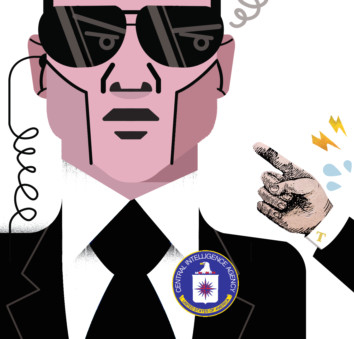
When I wrote in August 2016 that Donald Trump’s character traits posed a national security threat to America, I didn’t imagine that the first manifestation of that dynamic could play out with the very organisation where I had spent the first 33 years of my career, the Central Intelligence Agency (CIA).
President-elect Trump’s public rejection of the CIA, and by extension the rest of the intelligence community, over the assessment that Russia had interfered in America’s presidential election is not only an unprecedented political challenge for America’s national security establishment — it is a danger to the country.
Trump is questioning the agency’s competence — repeatedly asking, often via Twitter, how we can trust the organisation that incorrectly judged that Saddam Hussain had weapons of mass destruction (criticism that, in my mind, is unfair for an agency that has changed dramatically in the last 15 years). But he is also accusing the agency of being biased and political, implying, in comments to the New York Times this morning, that the CIA is manufacturing its Russia analysis to undercut him. Trump, in essence, is saying that the agency’s officers are dishonourable. To the men and women of the CIA, sworn to protect America, this is a gut punch.
In my opinion, Trump’s repudiation of the CIA flows from his desire to protect his brand at all costs (to him, accepting that the Russian president, Vladimir Putin, interfered in the American presidential election would be an admission that his victory was tarnished), his need to always be right (from his perspective, it is not possible that he could have been wrong in praising Putin), his refusal to change his views based on new information and his unwillingness to listen to others. It flows from who he is as a person. It was the reason so many of America’s national security professionals were so concerned about the prospect of his becoming commander in chief.
This is not just a matter of insulting loyal Americans. I have no doubt that Trump’s behaviour vis-a-vis the CIA, if it is not fixed soon, will put America at risk. It will weaken an agency that has never been more relevant to our safety. The key national security issues of the day — terrorism; proliferation; cyberespionage, crime and war; and the challenges to the global order posed by Russia, Iran and China — all require first-rate intelligence for a commander in chief to understand them, settle on a policy and carry it out.
How will President Trump know whether the Iranians are living up to their commitment not to produce a nuclear weapon without good intelligence? How will he know how close the North Koreans are to mating a nuclear weapon to a long-range missile and successfully detonating it over American soil? How will he know whether Daesh (the self-proclaimed Islamic State of Iraq and the Levant) or Al Qaida is plotting another 9/11-style attack?
The president-elect’s behaviour will undermine the effectiveness of the CIA in two key ways. First, expect a wave of resignations. Attrition at the CIA, which has been remarkably low since September 11, 2001, will skyrocket. The primary motivator for some of the agency’s smartest minds to go to work at the CIA is to make a difference to national security, to play a role in keeping the country safe. All of the sacrifices — from the long hours, polygraph tests, unfair media criticism, not to mention the real dangers to life and limb — are worth it, if you are making a difference.
If the president rejects out of hand the CIA’s work, many officers will vote with their feet. These officers cannot be easily replaced. It takes years of training and, more important, on-the-job experience to create a highly capable case officer, analyst, scientist, engineer or support officer. It would take at least a decade to recover from a surge in resignations.
There is precedent for this. When former US president Jimmy Carter’s CIA director, Stansfield Turner, made it clear that, in his view, technology was making human intelligence obsolete, hundreds of officers departed. He then fired hundreds of others who questioned his approach. It took years for the agency to return to its pre-Turner strength. The Trump resignations could make the Turner departures pale by comparison.
The president-elect’s rejection of the agency will weaken it in a second way. Why would a foreign intelligence service take the CIA seriously (and share important information with it) when the American president doesn’t? A strong relationship between the CIA and the president is a key incentive for other intelligence services to work with Langley. Take that away and America’s foreign relationships — which are absolutely critical in the global fight against terror, proliferation, you name it — will suffer.
And why would a foreign agent take extraordinary risks to spy for the US if his information is not valued? Knowing their information is making its way to the president is an important motivator for spies. Would the modern-day Adolf Tolkachev, the CIA’s most important agent within the Soviet Union — who was executed as a spy in 1986 — sign on to work for Trump? I doubt it. The potential loss of critical information could be extraordinary.
Trump’s attacks on the agency surprised me, but they shouldn’t have. It is not a coincidence that Trump, who has never let facts get in the way of his opinion, would fight with the organisation whose very reason for existence is to put facts on the table. He will have similar fights with other government agencies and America will suffer for it.
— New York Times News Service
Michael Morell was the deputy director and twice acting director of the Central Intelligence Agency between 2010 and 2013. He is a senior counsellor at Beacon Global Strategies.










